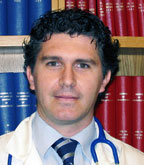Selected Works of Francesco Del Galdo, MD, PhD
Expression of allograft inflammatory factor 1 in tissues from patients with systemic sclerosis and in vitro differential expression of its isoforms in response to transforming growth factor beta
Francesco Del Galdo, Thomas Jefferson University; Gerd G. Maul, The Wistar Institute; Sergio A. Jimenez, Thomas Jefferson University; and Carol M. Artlett, Thomas Jefferson University
DATE: August 2006
SOURCE: Arthritis & Rheumatism, vol. 54, iss. 8, pp. 2616-2625
RELATED URL: http://www3.interscience.wiley.com/journal/112730097/abstract?CRETRY=1&SRETRY=0
ABOUT THIS DOCUMENT:
This article has been peer reviewed. It is freely available from the publisher's website.
ABSTRACT:
OBJECTIVE: Allograft inflammatory factor 1 (AIF-1), a protein initially identified in chronically rejected rat cardiac allografts, is involved in the immune response and proliferative vasculopathy that occurs during allograft rejection. Three well-characterized isoforms of AIF-1 result from alternative messenger RNA (mRNA) splicing. We previously identified a strong association of systemic sclerosis (SSc) with a polymorphism in AIF-1 isoform 2. The purpose of this study was to investigate AIF-1 expression in affected tissues from patients with SSc and to examine the regulation of its isoforms by transforming growth factor beta (TGFbeta).
METHODS: AIF-1 in the skin and lung tissues of patients with SSc was analyzed by immunochemistry. AIF-1 isoform expression in response to TGFbeta and interferon-gamma stimulation was examined by quantitative polymerase chain reaction (PCR).
RESULTS: AIF-1 protein was present in affected vessels of the lung and skin lesions of patients with SSc. Quantitative PCR showed an average of 14-fold higher mRNA levels in affected SSc skin than in normal skin. Double-label immunofluorescence staining demonstrated that T cells, macrophages, and endothelial cells in affected tissues expressed AIF-1. Stimulation of peripheral blood mononuclear cells with TGFbeta caused a specific and significant increase in the expression of AIF-1 isoform 2 transcripts (P < 0.005), which was due to stabilization of AIF-1 isoform 2 mRNA.
CONCLUSION: These data suggest that AIF-1 plays an important role in the pathogenesis of SSc owing to its increased expression in affected tissues and to the specific stimulation of AIF-1 isoform 2 by TGFbeta.

